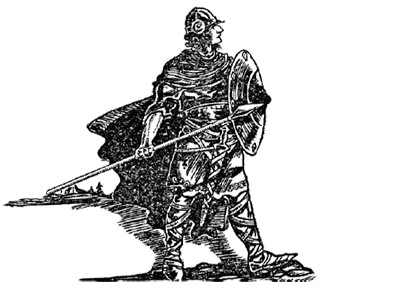
THE GAE BULGA — CUCHULAINN'S SPEAR.
"The gai-bulga, or gae-bolga (the belly-dart) is unique among the weapons of Ireland.
"This was the character of that dart," says the ancient Táin Bó Chuailgne: "It was upon a stream it should be set,
and it was from between the toes it should be cast. It made but the wound of one dart in entering the body; but it
presented thirty inverted points against coming back; so that it could not be drawn from a person's body without
opening it."
"Concerning this weapon," says Prof. O'Curry ("Ancient Irish," p. 310, vol. 11), "if we only knew of it from the
exaggerated description of the manner in which it tore its way through Ferdiad's questionable armor, its existence
at all might be very well doubted; but, in another ancient tale, we have very fair authority to show that Cuchulaind
had unwittingly killed his own son Conlaech with this very weapon, in an ordinary combat on the shore, near Dundalk."
Like the Tathlum, or sling-ball, with which the champion Balor was killed in the battle of the Northern Magh Tuireadh,
the gae-bolga has been assigned an Eastern origin by a very ancient Irish poet. His poem, in Gaelic, opens thus: —
"How was the gae-bolga discovered?
Or by whom was it brought hither
From the Eastern parts of the world?
"Inform those who are ignorant
That this weapon originally came hither
From Bolg Mac Buain, in the East,
To Cuchulainn, in Muirtheimhne."
|
The poet goes on to relate that the champion Bolg Mac Buain found, on the sea-shore, the bones of a monster called
the Curruid, and "made the wild spear from the bones of the kingly monster." Mac Buain gave the gae-bolg to Mac Inbar;
who gave it to Lena, his friend; who gave it to Dermeil; who gave it to Scáthach, the teacher of the war college of
Alba (Scotland); who gave it to her daughter Aife (Cuchulaind's mistress); who gave the weapon to Cuchulaind.
"Cuchulaind brought the gae-bolg
Into Erinn, with all its barbs;
By it he slew Conlaech of the shields,
And Ferdiad afterwards."
|
Such is the account of the origin and history of the famous gae-bolg, as preserved in an extremely old Gaelic poem."
Text Source:
O'Reilly, John Boyle. Ethics of Boxing and Manly Sport.
Boston: Ticknor and Company, 1888. 220-222.
|

